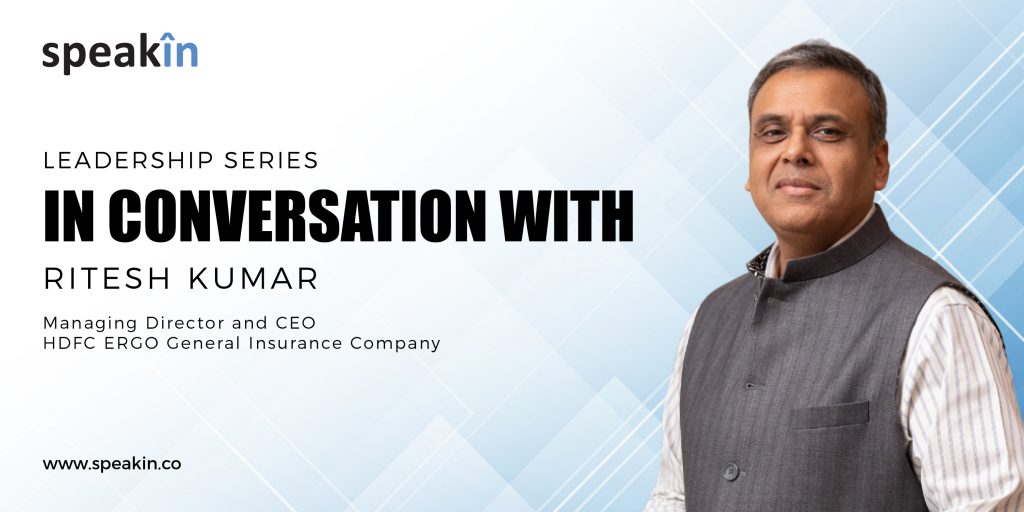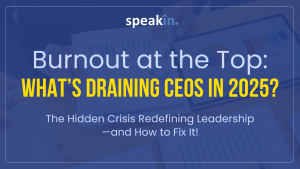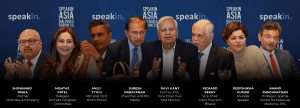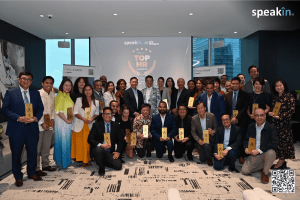Insurance sector leadership is gratifying—it’s a social role in India’s underserved market
Ritesh Kumar is the Managing Director and CEO, who sees his role in terms of “providing direction, reassurance and guidance to the diverse group of people working to make HDFC ERGO the gold standard in India’s general insurance.”

HDFC ERGO General Insurance Company Limited is a 51:49 joint venture firm between HDFC Limited and ERGO International AG, an insurance entity of Munich Re, a leading global provider of reinsurance, primary insurance and insurance-related risk solutions.
Ritesh Kumar is the Managing Director and CEO, who sees his role in terms of “providing direction, reassurance and guidance to the diverse group of people working to make HDFC ERGO the gold standard in India’s general insurance.”
SpeakIn Asia Dialogues spoke to Ritesh about HDFC ERGO, his personal and professional journey, about leadership, and about the importance of coaching and mentoring.
These are excerpts from the conversation:
The best place to start is usually the beginning. So, that’s where we will start. Tell us where you grew up, what you studied, about your first job, and at what point did you come into the insurance sector?
I am from Delhi. My father had a transferable job and in my schooling happened across as many as six different schools. I graduated from Delhi’s Shri Ram College of Commerce, and then got an MBA degree from Faculty of Management Studies in Delhi. I have been working in financial services space for the last thirty years—first in banking and then in insurance when it opened up in India at the start of the millennium. My initial years with banking gave me a lot of exposure to various sectors. Through these 20-odd years in insurance, I’ve handled diverse portfolios.
Who or what has shaped you into the person you are today?
I have had a middle-class upbringing and that’s had a profound influence on me. In terms of individuals, I would definitely name my father, who taught me timeless, priceless lessons in those formative years. And, I can never be thankful enough to have worked with leaders who have shaped me into the person that I am today.
How do you challenge yourself and what are your passions in life?
We need to be able to constantly challenge ourselves. There’s hardly a stage in your life when you stand back and say: now I know it all. That’s not possible. We all need to be learners all the time; the day we think we know it all probably is the beginning of the end.
The quest for personal and professional growth is constant and you could say it goes hand in hand. What I’ve discovered in the course of my career is that you cannot be wedded to a location. I’ve seen people who are too comfortable and don’t want to move out of metro cities. I think that severely limits their career growth, especially in the early part of one’s career.
And your passions in life. . .
I love travelling. That’s always invigorating for me. Also, I have a passion for numbers. So, I love Sudoku. I also like painting sometimes.
How do you broadly view the insurance sector?
Insurance sector leadership is gratifying—it’s a social role in India’s underserved market. Insurers make a difference to human lives. You help people when they are in distress. Bringing financial stability to people’s lives when they need it most is something that gives all insurers a sense of achievement.
How would you define leadership? And tell us about your leadership philosophy and also how you embody that philosophy?
Leadership to me is about guiding and inspiring people to move to the next level. It’s about challenging the status quo. I often differentiate between a leader and a manager—a manager is someone who is given a position by virtue of being in an organisation and that’s how he/she wishes to command respect. A leader, on the other hand, commands respect by influencing people in the team. The people look up to the leader. Are you as a leader able to inspire them? Do they to you with their personal issues and in their bad times? Good leadership is about being sensitive to the needs of your people and giving them entrepreneurial freedom. I like democratic style of leadership wherein I want people to debate and then we reach a conclusion.
Leadership to me is about guiding and inspiring people to move to the next level. It’s about challenging the status quo.
How is HDFC ERGO’s business faring? Can you do a quick SWOT analysis of the business as it stands today?
Let’s start with India’s insurance landscape. It is very exciting. What we are experiencing in India is Insurance 4.0. We had insurance in before the 2000s, and then the private sector was allowed in, following which we witnessed a positive change which drove the demand for insurance in an underserved market. This now is the 4.0 era when insurance is becoming more of a pull product. During the pandemic, the general insurance industry lived up to its promise and paid Rs. 25,000 crore in COVID-related claims. Also, the penetration of 0.5% to 1% has been commendable and the insurance industry has been growing at an average of 16%. The present regulatory reforms are based on three focused initiatives: increasing awareness, accessibility and affordability of insurance products. I am confident this will grow the industry and fulfil the aspiration of ‘Insurance for All by 2047’.
Talking about HDFC ERGO, we started out as a small company and over the years grown tremendously. We have grown in the numbers of customers and also in terms of being able to serve the people and make a positive difference to their lives. Importantly, we have grown in terms of digital adoption and the speed with which we have been able to address the needs of our customers. India is a diverse country and we are able to communicate in twelve different languages with customers. Our website is also available in four languages.
Being an insurer who is empathetic and sensitive towards its customers is what drives us to be swift and prompt.
So, what would you list as your career learnings? Say top five. . .
- For me, most important learning is that a leader is as good as his/her team. You need a competent set of people otherwise you would not be able to grow yourself in life. As a leader you need people who have skill-sets that complement yours. Your team determines what you are. Individual work can only take you so far, beyond that you need teamwork.
- Attitude matters. Having the right attitude is more important than anything else.
- You need to be lifelong student. Keep learning. That’s one thing that must never come to an end.
- Don’t be wedded to a location. We all have family compulsions but to grow in life we have to be mobile.
- Develop your team. Inspire them. Motivate them.
Drawing on your long experience, how important would you say coaching and mentoring are in an executive’s quest for reaching the highest echelons in the corporate world?
Coaching and mentoring are extremely important nowadays. Gone are those days where we could see the rear-view mirror and drive. It’s imperative that we continue to learn new skills, irrespective of the levels where we are at. We all have got blind spots and through coaching and mentoring we can identify our blind spots.
(Ritesh Kumar is the Managing Director and CEO of HDFC ERGO General Insurance. He is a career financial services professional with a passion for creating scalable businesses.)





